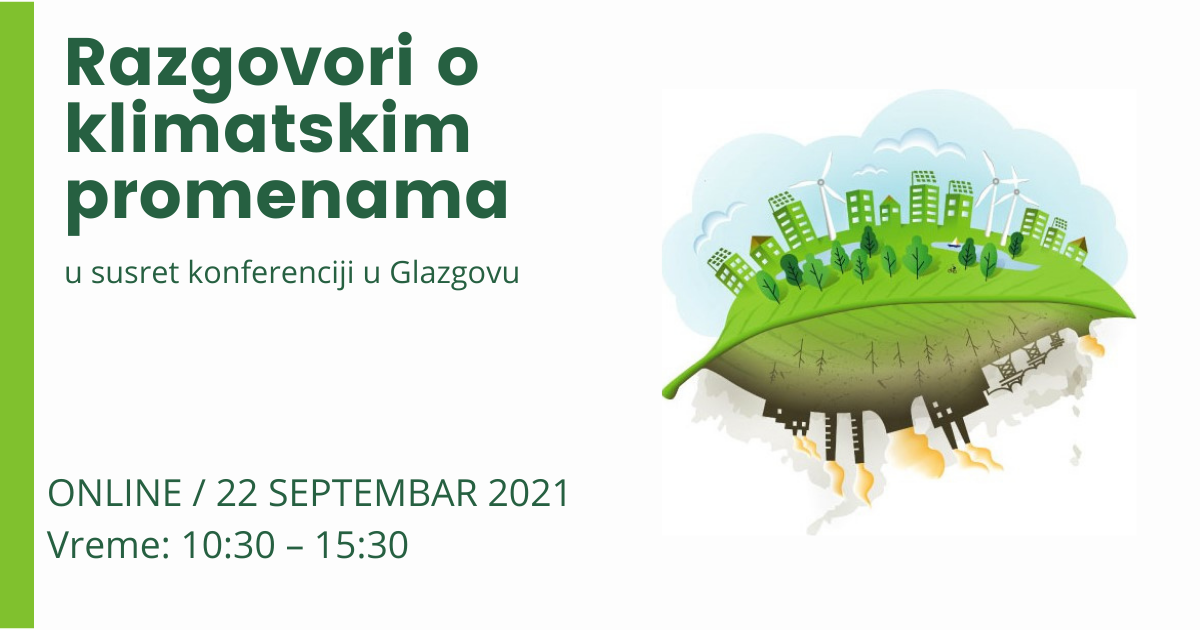In order to stimulate discussion on climate change and the climate ambitions of Serbia in the society, a forum that brought together decision makers, representatives of the international community, the economy, and civil society, and experts on climate change was held today.
The meeting was opened by Francois Jacob, UN Resident Coordinator in Serbia, and Irena Vujović, Minister of Environmental Protection, while the panel of high-ranking guests included Shan McLeod, British Ambassador to Serbia, Carlo Lo Caso, Italian Ambassador to Serbia, Nicola Bertolini, Head of Cooperation in the EU Delegation to Serbia and Francine Pickup, the Resident Representative of the United Nations Development Program (UNDP) in Serbia.
The Minister of Environmental Protection, Irena Vujović, asserted that COP26 is an important event for all of us and that it is a great honor for Serbia to be one of the Vice Presidents of this conference. “The Republic of Serbia will increase its climate ambitions and revise its nationally determined contributions so that a reduction of greenhouse gases (GHG) of 33% is achieved by 2030, in comparison to the 1990s.” On this occasion, the Minister announced that, in accordance with the Green Agenda of the European Union for the Western Balkans, the Ministry will launch new initiatives that will be aimed at transitioning to a circular economy in the public and private sectors.
The participants in the meeting highlighted the Economic and Investment Plan for the Western Balkans, through which the EU has allocated up to 9 billion dollars in non-refundable aid for the green transformation of the economy and the public sector in the region. Transitioning to green models of business will enable Serbian companies to access and utilize not only these funds, but also the funds of other international financial institutions that have included green business as one of the key criteria for approving loans and credits.
The participants in the forum pointed out that Serbia has already increased its goals of reducing GHG emissions by 3 times compared to 1990 levels. Achieving these goals necessitates a gradual transition from fossil fuels to renewable energy sources, but for this transformation to be carried out in a fair way, new opportunities for green jobs and the retraining of workers must be realized, especially in the energy sector, the experts insisted.
However, there are other solutions that can accelerate Serbia on its path to a low-carbon society, such as afforestation, employing cleaner technologies in industrial production, and transitioning to a circular economy, which includes reducing waste and treating waste as a resource, among other activities.
Another key segment that would help Serbia achieve its climate ambition is a transparent system for collecting and analyzing climate data. One of the panels presented the results of the development of a system for monitoring, reporting, and verifying data in the field of climate change. Such a system would enable better collection, accessibility, and exchange of data related to climate change between different institutions, which would help the Government of Serbia identify where additional efforts are needed. At the same time, this would contribute to the implementation of the Law on Climate Change, adopted this year, and to the fulfillment of obligations under the UN Framework Convention on Climate Change (UNFCCC) and the Paris Agreement.
The Serbia’s Climate Change Talks were realized with the support of UNDP projects implemented in cooperation with the Government of the Republic of Serbia, and with the help of partners such as the Green Climate Fund (GCF), the Global Environment Facility (GEF), the Swedish International Development Cooperation Agency (SIDA), the Government of the Republic of Austria, and the Government of Switzerland, as well as with the UN agencies UNOPS, UNICEF, FAO, and UNECE.
For more information please visit the event website: Climate Talks – Klimatske promene







